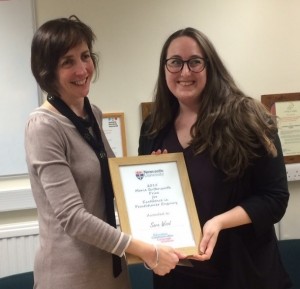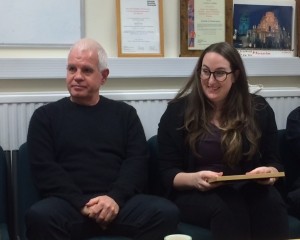Introduction
During December 2015 a fourth cohort of academic colleagues from universities across Kazakhstan undertook a study visit to Newcastle University. The visit was hosted and facilitated by staff from ECLS and managed through the North Leadership Centre. Our visitors had a busy schedule of taught sessions and workshops during which they were offered insights into a wide range of academic practices. At the same time the visitors experienced British life – both in Newcastle and further afield. Every day was an opportunity for learning, but what have they learned and what difference will it make in their own work and in development of Higher Education in Kazakhstan? Here in their own words (italics) are reflections on their experiences with a focus on how their visit will help them to develop their practices in their own contexts. As one group wrote in their reflection the educational systems in Kazakhstan and UK have their strong and weak sides. We should take the best of the both systems.

Professional development
Contributions from Darya Pashkanyan, Latipa Issembaeva, Yelena Dubinina, Bakytgul Ibraimova, Saule Mamytova.
Following the session on professional development our visitors wrote that an important factor in formation of professional development is critical reflection. We believe that critical reflection is the use of important experiences to identify assumptions and extract learning to move forward. They went on to recognise the importance of their autobiographies as learners and teachers, students’ eyes, colleagues’ experience and theoretical literature to support critical reflection. Extending beyond reflection they also articulated the value of
- studying our teaching for professional improvement,
- systematically evaluating our teaching through classroom research procedures,
- linking theory with own practice,
- questioning our personal theories and beliefs,
- considering alternative perspectives and possibilities
- trying out new strategies and ideas.
Their aim is to maximise the learning potential of all our students and enhance the quality of our teaching. It is important to them to ensure that professional development will allow us to be competitive on the educational market. It seems that staff in universities across the world share the same concerns. During the study visit significant time was given to microteaching as a professional development activity. This is considered in the next section.

Microteaching
Written by Mariyash Jumagulova, Raushan Zhexembayeva, Dinmukhamed Kelesbayev, Galina Karimova, Karlygash Shetieva.
During our visit to Newcastle University Microteaching session was conducted as one of the main program course for the purpose of using peer observation in teacher development. Microteaching sessions 1 and 2 were delivered to us. During the lesson 1 various activities were done. In small groups we compared and discussed our experiences and approaches to peer observation. The aims of Microteaching 1 were the following: to consider the role of feedback in professional practice, skills and attitudes needed for successful learning from practice, discuss and identify ways to become involved in peer review or to enhance existing peer review processes. Three modules of peer observation were referred: Evaluation Module, Development Module and Collaborative Module and principles of attuned interaction were introduced. At the end of session 1 preparation homework tasks for Microteaching 2 were given.
Session 2 was very unusual and interesting. Each learner led and managed a seven minute Microteaching or discussion activity on the definite topic which was discussed. The plans of the activities were covered by metacognitive approaches of learning (Map from memory, Odd One Out). After the activity each participant was asked how they think it went and had a short reflective discussions with the group for 5 minutes. Post-observation discussion was initiated by the members of the group. Each learner was drawn her or his attention to what happened and was invited to reflect. The learners tried to comment on every aspect of teaching session. Each learner answered any further comments and accepted offered suggestions positively.
We think we gained effective and useful information having been provided, participated in and observed interactive microteaching episodes. So we came to conclusion that a microteaching session is much more comfortable than real classroom situations, because it eliminates pressure resulting from the length of the lecture, the scope and content of the matter to be conveyed, and the need to face large numbers of students, some of whom may be inattentive or even hostile. Another advantage of microteaching is that it provides skilled supervisors who can give support, lead the session in a proper direction and share some insights from the pedagogic sciences. In conclusion we must say that we will extend our microteaching episode practices. If it’s possible we will try to experiment with using the principles of attuned interaction in our future teaching activities and in development of Higher Education in Kazakhstan.

Group work
Contributions from Gulmira Adilbektegi, Lyazzat Zhunussova, Zhanar Talaspayeva, Bauyrzhan Nurimov.
Some of our visitors indicated relatively little experience of creating teaching situations in which students work in groups, and so they selected this as a key theme for teaching development on their return to their universities. In particular they were interested in the way that student group work could contribute to acquiring skills necessary for effective collaboration such as students listening and respecting each-others’ contributions. They also noted that group work can support the self-realization of the student and the development of active leaders through the formulation of cumulative reasoning and creation of productive solution to questions related to their subject. They recognised that this needed teachers in HE to think about their roles differently, although they were reassured that groupwork can be planned and structured and teachers can use techniques to facilitate group and individual learning, including strategies for preventing difficult situations in groups.
Online learning tools
Contributions from Orynbassar Joldasbayev, Akmaral Shokanova, Raushan Torgayeva, Boris Rabinovich, Inkar Kulenova.
Another area for productive development in teaching and learning is online learning. The visitors recognised that online learning is getting more popular all over the world, a lot of Universities and Higher Institutions use it for teaching and learning because young generation like new IT-technologies. They were introduced to online platforms such as Moodle, WordPress, OneNote, and Twitter and discussed how they can be successfully used in education and training because they fit not only for communication with one student (as e-mail) but with the group of students at the same time. They suggested that potential benefits of online learning include
- On-line platforms increase students’ motivation.
- They are good for giving and receiving feedback.
- Any teacher can create his or her own blog if needed.

Conclusion “What experience will we go back to Kazakhstan?”
Contributions from Kairat Tlebayev, Zhanara Kultanova, Arailym Omarova.
We are the members of LTHE sessions held in Newcastle University, UK. The Republican Institute of Increasing of Qualification of Teachers “Orleu” Republic of Kazakhstan every year send group of teachers from different universities of republic for conducting teaching training. The idea of Leader, Nursultan Nazarbayev is to raise the teachers’ level on the level of the world. To realise this purpose it is necessary to prepare high-qualified teaching any disciplines in English. This programme provides the opportunities. One of the best reasons for this programme is increasing of teachers’ professional development to gain more teaching experience from UK colleagues on the sessions.
Several key aspects were highlighted in the transition back to their home universities;
- The difference in UK is teaching in groups;
- The role of team teaching (more than two teachers share their ideas in one session);
- The lecturer makes his or her sessions have a good and more comfortable atmosphere;
- The lecturer teacher provides directions for students and they actively discuss the given problem.
- The lecturer can use online teaching lectures.
As we welcome, work with and bid farewell to each cohort of Higher Education colleagues from Kazakhstan we learn about their culture and education practices, just as they learn from ours. What is perhaps as significant is the opportunity that this visit gives them to learn from each other – across the universities in Kazakhstan itself. As our conclusion authors wrote, this programme provides the ways to communicate and collaborate between teachers. Teachers in all settings are very busy and often work in relative isolation. We are pleased to provide a space and a programme in which teachers can learn from and with each other.








